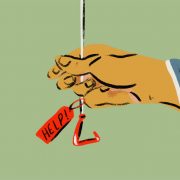I’m a Christian Leader—Should I Be Struggling with Depression?


It was the day after Christmas three years ago. My dad had just been diagnosed with stage 4 cancer. As we huddled in the doctor’s room, listening to the urologist explain his unexpected discovery, I recall wishing that time would freeze.

Or better still, that we could rewind the clock to the simple joys of just yesterday, which already felt worlds away. He’s too young to have cancer.




Anything that would soothe the hollow drum of my heartbeat. I knew that once we stepped out of the room, our lives would be drastically changed.
We were told there was little to be done. Dad’s rare and aggressive subtype of prostate cancer meant that the usual forms of treatment were unavailable. The cancer cells had metastasised to his bladder and lymph nodes. Surgical options, too, were off the table. Hearing this from one of the most experienced urologists in the country left us feeling hopeless and helpless. Was this the end of the road for dad? As the four of us—my dad, mum, sister, and I stood in the hospital corridor, letting the news sink in, all we could do was hug each other and cry out to God. Lord, please help us.
As it turned out, my sister’s boyfriend’s father knew of a urologist in Singapore who was renowned for complex tumour removals.
That very night, dad’s symptoms escalated in both pain and frequency, and he was admitted into the hospital. Within two days, my dad was wheeled into the operating theatre to surgically remove his prostate, bladder, and lymph nodes.
It was a flurry of events, with little time to think, let alone process. It’s all happening so quickly. We were learning how to trust God every day, even when trusting Him felt like the hardest thing. Through the long, blurry nights and bloodshot eyes, we were constantly reminded by friends and relatives of their fervent prayers and God’s ever-present love with us. Thank you, Lord, for guiding and providing.


I wish I could say that in less than a week, my dad was cancer free. In truth, it was just the beginning of a lengthy, ongoing journey of walking with God as a family as we supported dad in his battle against cancer.
It was after this first surgery that we discovered the cancer cells had already spread to his lungs and other organs. Visits to the oncologist increased as dad received various treatments, one after another: chemotherapy, radiotherapy, targeted therapy, immunotherapy, and further surgery. With each type of treatment came its unique challenges of physical side effects for dad; but also emotional, mental, and spiritual stressors on the whole family.






Little did I know that this episode would spark a persistent struggle with mental health. While I had previously experienced anxiety about exams or sadness when my grandmother passed, these emotions felt somewhat normal and short-lived. Growing up, I was described as cheerful and positive, ever half cup full. Very few things could get me down, and when they did, I still found a way to see a brighter tomorrow
But my experience with dad’s sickness felt very different. His cancer was mentioned at almost every meal. The calls and texts kept reminding me of a reality I could not yet accept. Battling the negative voices in my head, I tried to speak words of comfort and hope.


A month after dad’s diagnosis and surgery, I resumed my third year of studies overseas in Australia. Being away at the time was challenging—I was torn between wanting to be physically present for my family and pursuing my studies so long as dad’s condition was treatable. And yet, it was only in my fourth year of university, the year COVID-19 struck, and the year I became the chairperson of a Christian international student-run organisation, that my mental health came to a head. Of all times, why now?
What began as temporary bouts of sadness eventually became a lingering, suffocating blanket of doom and gloom. It was a dense grey cloud hovering above my head in the morning, settling on my shoulders during the day, and drenching me in a pool of tears every night. I started feeling irritable at everyone and everything. Why is he being so insensitive? Does she even care? Why doesn’t anyone understand? And all the while, nobody knew, because I never let them. Every time my family rang, I would assure them that I was doing just fine. Why worry them? They have enough on their plates. Every time I left my room, I put on my best dress and my biggest smile.




And so, I threw (what I believed to be) my heart and soul into everything I did. I chaired the committee meetings, planned our leaders’ retreat, led Bible study, met at least two different people each week, and called my family every other night. I never missed a class and submitted all my assignments on time. Even when we went into lockdown, I made it my responsibility to pull everyone together. We will get through this! Keep loving one another! Trust God! Doing things online can be fun too!








But I was growing more tired by the day. I was, essentially, trying to do the Lord’s work by my own strength. As a result, I had never been more confused and exhausted. My prayers to God felt empty. I was all emotion without direction. Lord, are you there? By the second half of my fourth year, I had lost passion and motivation. Nothing could hold my interest. I developed social anxiety and started pushing my loved ones away, avoiding group gatherings and family calls where possible. Close friends would check in, but I responded only a week or two later, when I could say I think I’m feeling alright.
Some days, it took me three hours to climb out of bed. On others, I barely slept.
As my thoughts began to spiral and drift towards death, I knew I needed to seek help.
After confiding in my boyfriend about my worsening mental health, he got me in touch with a mutual friend who was willing to share about his encounter with depression. It was through hearing his story and journey that I felt emboldened to seek out this specific Christian psychologist.
Seeing a psychologist was the lifeline I never knew I needed. Beyond finding a listening ear, I was relieved to be able to share openly with someone who was patient, wise, and empathetic in her counsel. She helped me recognise that depression and anxiety were not foreign experiences even for those who placed their faith in God. I realised that being a Christian did not mean immunity from pain and suffering in this lifetime.


Looking at the Biblical example of Job, a righteous man who endured intense loss, grief, illness, and abandonment,


Job’s laments were not shameful acts of disobedience, but rather, an expression of his faith in God. As C. S. Lewis put it, “My dear friend, when grief presses you to the dust, worship there.”
The more I shared with my psychologist, the more I could see that God’s grace was sufficient for me (2 Corinthians 12:9). He was teaching me to lay down my pride, my human strength, my poker face, and find healing and rest in His everlasting arms.


You don’t need to have it altogether. I did not need to prove myself worthy to be a Christian or a leader. I could come before God, broken and messy, knowing He still accepts and loves me regardless. As Corrie ten Boom said, “There is no pit so deep, that God’s love is not deeper still.”
Through this counselling process, God prepared me to be a leader. Instead of hiding behind a screen or a smile, I was empowered to be vulnerable with others. It was scary at first. Are they going to judge me for feeling this way? But, as it turned out, heaps of people were working through messy emotions too. They might not be experiencing the same circumstances, but everyone had troubles of their own. Being honest about my personal struggles enabled others to feel more secure or willing to share their burdens too. In this way, we could love and encourage each other to look to God and fix our eyes on Jesus, the pioneer and perfecter of our faith (Hebrews 12:2).
I also discovered that going through hardship was a necessary and refining experience. My encounter with mental health equipped me to better empathise with others. In the past, I strove to lend an ear and show sympathy to friends going through difficult seasons, but I could not understand how lonely or debilitated someone having anxious or depressive thoughts might feel. As I overcame my discomfort of telling people I saw a psychologist, God placed more people in my life—new and existing friends—who were similarly struggling with mental health. You are not alone. Being able to say that and to share my journey and testimony with these friends gave them the courage to overcome stigma and seek the professional help they needed.




Although I still have good days and bad days, I have learned that I cannot wait for difficulties to pass before I choose joy—the fullness of joy and peace that can only be found in relationship with God (Philippians 4:4-7). Having God as our Heavenly Father makes a big difference in our lives. Not only does He know us completely (Psalm 139), but He knows exactly what we need before we even ask (Matthew 6:8). My deep desire to be known and understood in my suffering can only be met by a perfect and loving Father who cares for me better than anyone else.
There will be storms in this life, and sometimes we may feel like we are drowning, but with Christ in the vessel, we have an eternal hope that anchors our souls (Hebrews 6:19). Knowing that our lives and salvation are secure in Him gives me the assurance and confidence that no matter what happens, I will see my dad, my family and friends, altogether again in Heaven. God has promised that one day He will wipe every tear from our eyes—no more death or mourning or crying or pain (Revelation 21:4). How beautiful is that? Till then, I will simply learn to trust Him more and more.
As of today, my dad is completing what we hope will be his last cycle of chemotherapy. Recent scans have shown that the tumours are responding to the treatment, so we are praying hard that every cancer cell will be eradicated in God’s good timing. My family deeply appreciates all the prayers that have been said—prayers that have helped us to “be joyful in hope; patient in affliction; and faithful in prayer.” (Romans 12:12)










Leave a Reply
Want to join the discussion?Feel free to contribute!